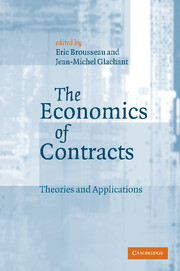Book contents
- Frontmatter
- Contents
- List of figures
- List of tables
- List of contributors
- Acknowledgments
- Part I Introduction
- Part II Contracts, organizations, and institutions
- Part III Law and economics
- Part IV Theoretical developments: where do we stand?
- Part V Testing contract theories
- Part VI Applied issues: contributions to industrial organization
- Part VII Policy issues: anti-trust and regulation of public utilities
- 22 Inter-company agreements and EC competition law
- 23 Incentive contracts in utility regulation
- 24 Contractual choice and performance: the case of water supply in France
- 25 Institutional or structural: lessons from international electricity sector reforms
- 26 Electricity sector restructuring and competition: a transactions-cost perspective
- Bibliography
- Index of names
- Subject index
23 - Incentive contracts in utility regulation
Published online by Cambridge University Press: 16 January 2010
- Frontmatter
- Contents
- List of figures
- List of tables
- List of contributors
- Acknowledgments
- Part I Introduction
- Part II Contracts, organizations, and institutions
- Part III Law and economics
- Part IV Theoretical developments: where do we stand?
- Part V Testing contract theories
- Part VI Applied issues: contributions to industrial organization
- Part VII Policy issues: anti-trust and regulation of public utilities
- 22 Inter-company agreements and EC competition law
- 23 Incentive contracts in utility regulation
- 24 Contractual choice and performance: the case of water supply in France
- 25 Institutional or structural: lessons from international electricity sector reforms
- 26 Electricity sector restructuring and competition: a transactions-cost perspective
- Bibliography
- Index of names
- Subject index
Summary
Introduction
Incentive contracts transformed the theory and practice of regulation in the last quarter of the twentieth century. Emphasis shifted from control and prescription to incentives and discretion, with significant implications both for outcome and for the distribution of benefits and risk. We trace the development of this change, illustrating it with the British experience of utility regulation where the shift from public ownership to explicitly regulated private companies has been particularly stark. This chapter provides a broad-brush analysis of recent issues and developments in this rapidly changing area of economics, rather than attempt to detail all the individual problems. Our main focus is on key issues such as welfare, efficiency, and the development of competition. This last category has drawn increasing attention from regulatory economists, as governments race to introduce competition in utilities and theory strives to keep pace with practice. Where issues are only briefly discussed, we suggest articles that cover specific topics in more detail, and in particular seek to update the arguments since 1995. In section 2, we first address the question of why regulation is needed, identify experience in the past, and examine regulation as a simple principal-agent model. In section 3 we trace the growth and development of incentive contracts such as the price cap. Section 4 suggests that introducing competition may not prove to be the regulatory panacea once envisaged, and identifies practical issues including distribution concerns, which have marred the original concept of incentive contracts in regulation, and assesses their prospects; section 5 concludes.
- Type
- Chapter
- Information
- The Economics of ContractsTheories and Applications, pp. 416 - 439Publisher: Cambridge University PressPrint publication year: 2002
- 1
- Cited by

